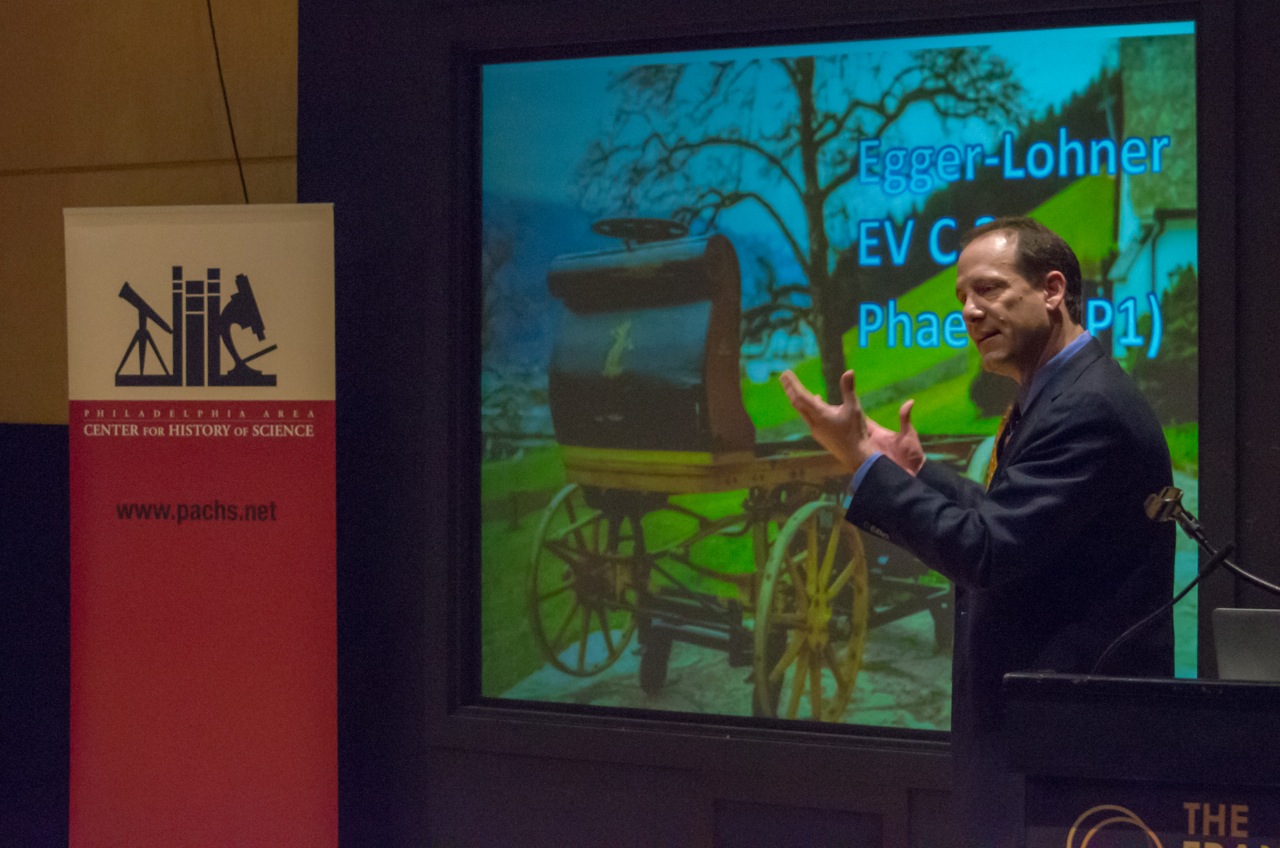Electric cars have a rich history in America. What is their future? Here is a report by Julia Mansfield, one of our Dissertation Writing Fellows, about a recent event at the Center.
A committed audience braved one the most bitterly cold evenings of the year to hear David Kirsch of the University of Maryland business school talk about electric cars. David is author of The Electric Vehicle and the Burden of History which came out from Rutgers University Press in 2000. He has written widely about technology, entrepreneurship and innovation for both history and management audiences.
This is an interesting time for electric vehicles. Consumer Reports Magazine, for example, named the Tesla Model S its best reviewed car for 2014, following a finding the previous year that it was the best car they had ever tested.

David Kirsch at the Musser Theater of the Franklin Institute
David gave a fascinating talk and had very lively discussion with the audience at the Franklin Institute. Here is a report by Julia Mansfield of Stanford University. Julia is one of our Dissertation Writing Fellows this year.
Professor David Kirsch (University of Maryland) balances skepticism with excitement when he discusses electric cars. Since 1900, he warns, the electric car has been always the car of tomorrow, but never the car of today. Professor Kirsch discussed the history of electric cars on January 29th at a PACHS lecture. His remarks made me wonder if the electric car is more likely to be the car of India’s tomorrow or China’s tomorrow rather than America’s.
“Better battery bugaboo,” the idea that the slow adoption of electric vehicles lies primarily in the efficiency of batteries is a myth, according Professor Kirsch. The use of electric vehicles, like the adoption of most technologies, involves consumer expectations, infrastructure, economics, and habit. In 1900 New York City had electric cars. Used as delivery trucks and taxis, the electric cars rode beside horse-drawn carriages, gasoline cars, and bicycles. Wealthy gentlemen preferred the speed and thrill that came with internal combustion engines, but taxi drivers needed the low cost of an electric car. The electric car had its niche, in other words, but infrastructure limited its range. Then, Henry Ford created a universal car, and the consumers’ imagination gave it new uses. Now, we rely on internal combustion engines for road-trips, grocery runs, and daily commutes. The diversity in our transportation has shrunk.
Since the 1950s, the electric car has had optimists cheering for its comeback, says Professor Kirsch. Experts have predicted again and again that electric cars will usurp their rivals. Again and again their predictions were off the mark. Professor Kirsch points out that electric cars may never dethrone Ford’s model, but they may still thrive. We can recreate the scenes of 1900 when vehicles served discrete functions. Perhaps, we can integrate the electric car into our current options. Think midpoint between moped and mini-van.
After listening to Professor Kirsch, I pictured the family tree of vehicles that we use – golf carts, motorcycles, bicycle taxis, etc. I realized that I have seen a wider range of vehicles in other countries than I see here. So I wonder, if the electric car is the vehicle of tomorrow, where will it thrive? Perhaps in a place where car ownership is not universal. Perhaps on streets that have more tuc tucs and bicycles than Philadelphia’s do. So, the scene of 1900 seems to me a look back to the future.